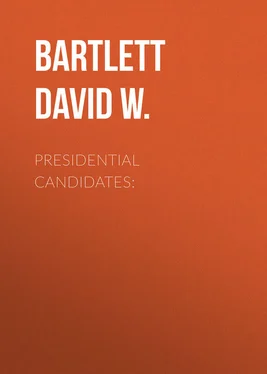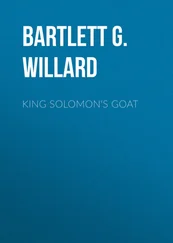David Bartlett - Presidential Candidates:
Здесь есть возможность читать онлайн «David Bartlett - Presidential Candidates:» — ознакомительный отрывок электронной книги совершенно бесплатно, а после прочтения отрывка купить полную версию. В некоторых случаях можно слушать аудио, скачать через торрент в формате fb2 и присутствует краткое содержание. ISBN: , Жанр: foreign_antique, foreign_prose, на английском языке. Описание произведения, (предисловие) а так же отзывы посетителей доступны на портале библиотеки ЛибКат.
- Название:Presidential Candidates:
- Автор:
- Жанр:
- Год:неизвестен
- ISBN:http://www.gutenberg.org/ebooks/35400
- Рейтинг книги:4 / 5. Голосов: 1
-
Избранное:Добавить в избранное
- Отзывы:
-
Ваша оценка:
- 80
- 1
- 2
- 3
- 4
- 5
Presidential Candidates:: краткое содержание, описание и аннотация
Предлагаем к чтению аннотацию, описание, краткое содержание или предисловие (зависит от того, что написал сам автор книги «Presidential Candidates:»). Если вы не нашли необходимую информацию о книге — напишите в комментариях, мы постараемся отыскать её.
Presidential Candidates: — читать онлайн ознакомительный отрывок
Ниже представлен текст книги, разбитый по страницам. Система сохранения места последней прочитанной страницы, позволяет с удобством читать онлайн бесплатно книгу «Presidential Candidates:», без необходимости каждый раз заново искать на чём Вы остановились. Поставьте закладку, и сможете в любой момент перейти на страницу, на которой закончили чтение.
Интервал:
Закладка:
"Having thus shown that the convention at Lecompton had no power, no authority, to form and establish a government, but had power to draft a petition, and that petition, if it embodied the will of the people of Kansas, ought to be taken as such an exposition of their will, yet, if it did not embody their will, ought to be rejected. Having shown these facts, let me proceed and inquire what was the understanding of the people of Kansas when the delegates were elected? I understand, from the history of the transaction, that the people who voted for delegates to the Lecompton Convention, and those who refused to vote, both parties, understood the Territorial act to mean that they were to be elected only to frame a constitution, and submit it to the people for their ratification or rejection. I say that both parties in that territory, at the time of the election of delegates, so understood the object of the convention. Those who voted for delegates did so with the understanding that they had no power to make a government, but only to frame one for submission; and those who stayed away did so with the same understanding.
"Now, let us stop to inquire how they redeemed the pledge to submit the constitution to the people. They first go on and make a constitution; then they make a schedule, in which they provide that the constitution, on the 21st of December, the present month, shall be submitted to all the bonâ fide inhabitants of the territory, on that day, for their free acceptance or rejection, in the following manner, to wit: Thus acknowledging that they were bound to submit it to the will of the people, conceding that they had no right to put it into operation without submitting it to the people, providing in the instrument that they should take effect from and after the date of its ratification, and not before; showing that the constitution derives its vitality, in their estimation, not from the authority of the convention, but from that vote of the people to which it was to be submitted for their acceptance or rejection. How is it to be submitted? It shall be submitted in this form: 'Constitution with Slavery, or Constitution with no Slavery.' All men must vote for the constitution, whether they like it or not, in order to be permitted to vote for or against slavery. Thus a constitution made by a convention that had authority to assemble and petition for a redress of grievances, but not to establish a government. A constitution made under a pledge of honor that it should be submitted to the people before it took effect; a constitution which provides on its face, that it shall have no validity, except what it derives from such submission, is submitted to the people at an election where all men are at liberty to come forward freely, without hindrance, and vote for it, but no man is permitted to record a vote against it.
"That would be as fair an election as some of the enemies of Napoleon attributed to him when he was elected first consul. He is said to have called out his troops, and had them reviewed by his officers with a speech, patriotic and fair in its professions, in which he said to them: 'Now, my soldiers, you are to go to the election, and vote freely just as you please. If you vote for Napoleon, all is well; vote against him, and you are to be instantly shot.' That was a fair election. This election is to be equally fair. All men in favor of the constitution may vote for it – all men against it shall not vote at all. Why not let them vote against it? I presume you have asked many a man this question. I have asked a very large number of the gentlemen who framed the constitution, quite a number of the delegates, and a still larger number of persons who are their friends, and I have received the same answer from every one of them. I never received any other answer, and I presume we never shall get any other answer. What is that? They say, if they allowed a negative vote, the constitution would have been voted down by an overwhelming majority, and hence the fellows shall not be allowed to vote at all.
"Let me ask you, why force this constitution down the throats of the people of Kansas, in opposition to their wishes and in violation of our pledges. What great object is to be attained? Cui bono ? What are you to gain by it! Will you sustain the party by violating its principles? Do you propose to keep the party united by forcing a division? Stand by the doctrine that leaves the people perfectly free to form and regulate their institutions for themselves, in their own way, and your party will be united and irresistible in power. Abandon that great principle, and the party is not worth saving, and cannot be saved after it shall be violated. I trust we are not to be rushed upon this question. Why shall it be done? Who is to be benefited? Is the South to be the gainer? Is the North to be the gainer? Neither the North nor the South has the right to gain a sectional advantage by trickery or fraud.
"But I am beseeched to wait until I hear from the election, on the 21st of December. I am told that perhaps that will put it all right, and will save the whole difficulty. How can it? Perhaps there may be a large vote. There may be a large vote returned. But I deny that it is possible to have a fair vote on the slavery clause; and I say that it is not possible to have any vote on the constitution. Why wait for the mockery of an election, when it is provided, unalterably, that the people cannot vote when the majority are disfranchised?
"But I am told on all sides, 'Oh, just wait; the pro-slavery clause will be voted down.' That does not obviate any of my objections; it does not diminish any of them. You have no more right to force a free-State constitution on Kansas than a slave-State constitution. If Kansas wants a slave-State constitution, she has a right to it; if she wants a free-State constitution she has a right to it. It is none of my business which way the slavery clause is decided. I care not whether it is voted down or voted up. Do you suppose, after the pledge of my honor that I would go for that principle, and leave the people to vote as they chose, that I would now degrade myself by voting one way if the slavery clause be voted down, and another way if it be voted up? I care not how that vote may stand. I take it for granted that it will be voted out. I think I have seen enough in the last three days to make it certain that it will be returned out, no matter how the vote may stand.
"Sir, I am opposed to that concern, because it looks to me like a system of trickery and jugglery to defeat the fair expression of the will of the people. There is no necessity for crowding this measure, so unfair, so unjust as it is in all its aspects, upon us. Why can we not now do what we proposed to do in the last Congress? We then voted through the Senate an enabling act, called 'the Toombs bill,' believed to be just and fair in all its provisions, pronounced to be almost perfect by the senator from New Hampshire (Mr. Hale), only he did not like the man, then President of the United States, who would have to make the appointments. Why can we not take that bill, and, out of compliment to the President, add to it a clause taken from the Minnesota act, which he thinks should be a general rule, requiring the constitution to be submitted to the people, and pass that? That unites the party. You all voted, with me, for that bill, at the last Congress. Why not stand by the same bill now? Ignore Lecompton, ignore Topeka; treat both those party movements as irregular and void; pass a fair bill – the one that we framed ourselves when we were acting as a unit; have a fair election, and you will have peace in the Democratic party, and peace throughout the country, in ninety days. The people want a fair vote. They never will be satisfied without it. They never should be satisfied without a fair vote on their constitution.
Читать дальшеИнтервал:
Закладка:
Похожие книги на «Presidential Candidates:»
Представляем Вашему вниманию похожие книги на «Presidential Candidates:» списком для выбора. Мы отобрали схожую по названию и смыслу литературу в надежде предоставить читателям больше вариантов отыскать новые, интересные, ещё непрочитанные произведения.
Обсуждение, отзывы о книге «Presidential Candidates:» и просто собственные мнения читателей. Оставьте ваши комментарии, напишите, что Вы думаете о произведении, его смысле или главных героях. Укажите что конкретно понравилось, а что нет, и почему Вы так считаете.










